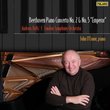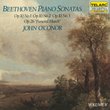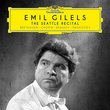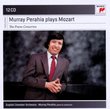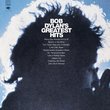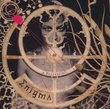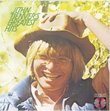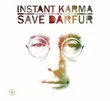| All Artists: Ludwig van Beethoven, Andreas Delfs, London Symphony Orchestra, John O'Conor Title: Beethoven: Piano Concertos Nos. 1, 3 & 4 Members Wishing: 0 Total Copies: 0 Label: Telarc Original Release Date: 1/1/2008 Re-Release Date: 9/23/2008 Genre: Classical Styles: Chamber Music, Forms & Genres, Concertos, Historical Periods, Baroque (c.1600-1750), Classical (c.1770-1830), Instruments, Keyboard Number of Discs: 1 SwapaCD Credits: 1 Other Editions: Beethoven: Piano Concertos Nos. 2 & 4 UPC: 089408070426 |
Search - Ludwig van Beethoven, Andreas Delfs, London Symphony Orchestra :: Beethoven: Piano Concertos Nos. 1, 3 & 4
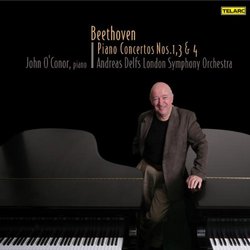 | Ludwig van Beethoven, Andreas Delfs, London Symphony Orchestra Beethoven: Piano Concertos Nos. 1, 3 & 4 Genre: Classical Irish pianist John O'Conor is a first-rate Beethoven interpreter who has previously recorded the complete Beethoven sonata cycle on 9 CDs on Telarc. This new release, with the help of Andreas Delfs and the London Symphony ... more » |
Larger Image |
CD DetailsSynopsis
Album Description Irish pianist John O'Conor is a first-rate Beethoven interpreter who has previously recorded the complete Beethoven sonata cycle on 9 CDs on Telarc. This new release, with the help of Andreas Delfs and the London Symphony Orchestra) completes his recording of the concertos. Similar CDs
Similarly Requested CDs
|
CD ReviewsO'Conor's Beethoven Ctos 1,3, 4: Classical Punch with Great Dan Fee | Berkeley, CA USA | 10/03/2008 (5 out of 5 stars) "It has taken Irish pianist John O'Conor a while to get around to recording the Beethoven piano concertos. Along the way, his complete set of the piano sonatas has been long heralded. His Beethoven bagatelles garnered fine praise as well. He is a Beethoven player in the clean, classical tradition exemplified by Wilhelm Kempff, Backhaus, Gieseking. John Lill, Leon Fleischer, Rudolf Serkin, and Anton Kuerti also come to mind as strong, clean Beethoven comparisons.
As it happens, O'Conor has inherited the maestro lead of the Beethoven master classes Kempff once taught in Italy, with O'Conor formerly there among the students of high preparation. If we need examples, consider those Schubert Impromptus and a Trout Quintet with Cleveland, performances which also rank very high among available recorded performances of those works, readings benefitted deliciously by O'Conor's way of melding clarity in finger work and harmonic inflection with a subtle warmth and color of tone that only grows on listeners, the more the discs are played. In this completion of the concerto series, we hear no let down, no relaxation from musical love into inattentiveness. O'Conor's way with Beethoven still carefully attends to the all-important sforzando, punched with expert musicality at all levels. This touch is still an apt keyboard hit, right on the note that arches the phrase or makes its rhythmic point while never, ever disrupting the phrase's flow. This player seems to hear the typical Beethoven harmonic narrative as an exceptionally clear and compelling story. So this player consistently conveys that a whole lot is happening in Beethoven's unfolding sonata-dramas, minus the more overtly-wrought sweat and blood and tears (not to mention the Lisztian posturing) that other players are wont to bring to their own, more overtly Late Romantic Way with Beethoven. Now the artist completes his Beethoven Piano Concerto cycle on Telarc, offering us superb readings of concertos one, three, and four. One suspects these performances will wear as well, and as long, as O'Conor's other Beethoven discs. I have already swooned in appreciation of piano concertos two and five in another comment. Not to mention how well received the pianist's readings of the complete sonatas set and the Bagatelles. In the early first concerto, which is actually the first published and the second written, O'Conor lands the composer's second youthful calling card, squarely in the silver platter of high musical arts. He is self-assured with a flourish that is incredibly knowing and incredibly wise. This Beethoven is an ambitious young fellow of strong genius who already knows he has no intentions of ever returning to his hometown of Bonn. Acknowledge, in the third and legendary fourth piano concertos, that O'Conor conveys all the grand sweep of line, color, gesture, and sheer musical size of both works. Despite the breadth of understanding, the pianist resists getting hysterical or bombastic - so effortlessly that one quickly wonders how in the world any of these three concertos could ever, ever, ever wear out their concert welcomes with any audience, anywhere. No warhorses, then. No old grandpa chestnuts, roasting quaintly on the western classical music home hearth fires. Quite without recourse to hackneyed or overblown manners, O'Conor refreshes a listener's hearing of these thrice-familiar works. I would guess that this piano player is hardly tired of playing Beethoven, no, not yet, not yet at all. So, who can tire of hearing him played, just this way? Alert. Fresh. Warm- with a most subtle warmth that goes down without a hiccup, smooth as butter. Only later might a listener pause to think that maybe it all wasn't really that easy. Only later might a listener pause to delve more deeply and mysteriously into asking: how could O'Conor really be that good, really be that much of a believer in the human size of big and small, lived life. One recalls Clara Haskil and Dinu Lipatti for all the warm poise of this homely, simple-seeming but magically-spun keyboard magic. Youngish German conductor Andreas Delfs leads the LSO in pace with the piano player in all three concertos. One again notices that the master recording is DSD, so one hopes for an SACD edition to arrive, soon. In any case, regular red book CD or future SACD, the conductor and orchestra are fine partners to the soloist. The band members get it all, too - the sforzando punch, the harmonic clarity, the strength of character and wit and classical transformation that render this approach to Beethoven distinctive, and probably indispensable. Now we realize that, truly, this remainder of the complete concerto series has achieved much. Now we realize we do have a golden addition to the available Beethoven catalogs of recorded music. Bravo to all involved. One passing bargain detail - you get all three piano concertos, on two discs, for the price of one. Get this one now, or wait for the SACD? Well. I got both the RBCDs, and I am breathlessly awaiting the super audio versions." |


